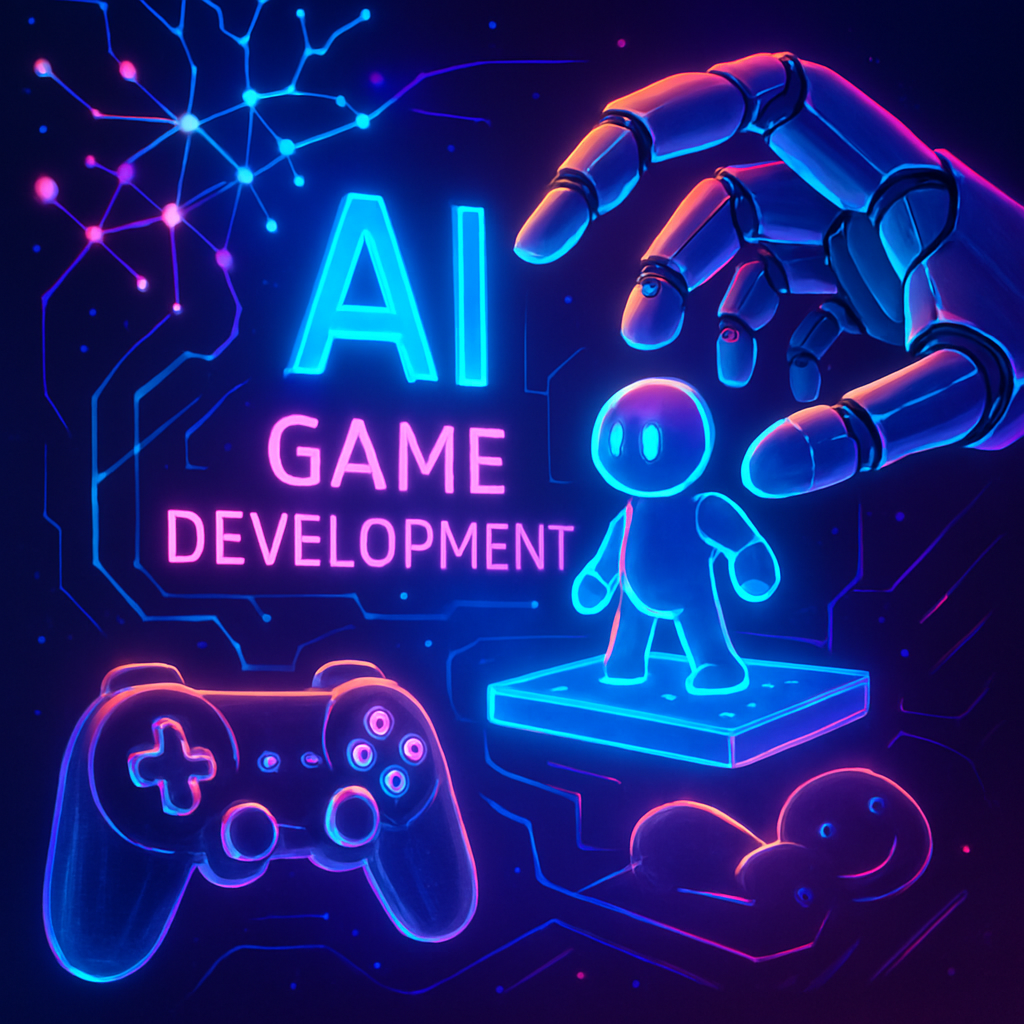
AI in Game Development: Creating More Immersive and Dynamic Gaming Experiences
Introduction: AI Pushing the Boundaries of Game Design
Artificial Intelligence (AI) has long been a component of video games, but recent advancements are transforming it from a simple scripting tool into a powerful force that is fundamentally reshaping game design and player experiences. AI is no longer just about making non-player characters (NPCs) move or react; it’s about creating deeply immersive, dynamic, and personalized worlds that adapt to player actions in unprecedented ways. This article delves into how AI is revolutionizing game development, from crafting believable NPC behavior and generating vast game worlds to balancing gameplay and personalizing experiences. We will explore key AI techniques, their applications, and potential affiliate opportunities for related tools and platforms that empower developers.
AI for Non-Player Character (NPC) Behavior: Beyond Scripted Actions
Creating believable and intelligent NPCs is crucial for immersive gameplay. AI is moving beyond simple, predictable scripted behaviors to more complex and adaptive NPC actions.
- Advanced Pathfinding and Decision Making: AI algorithms like A* (A-star) and more sophisticated machine learning models enable NPCs to navigate complex environments realistically and make intelligent decisions based on the game state and player actions.
- Behavior Trees and State Machines: These are common AI architectures that allow developers to design complex NPC behaviors with various states (e.g., patrolling, attacking, fleeing) and transitions between them.
- Machine Learning for Adaptive NPCs: Some games are experimenting with NPCs that learn from player interactions, adapting their tactics and behaviors over time to provide a more challenging and dynamic experience.
- Natural Language Processing (NLP) for Dialogue: While still evolving, NLP can enable more natural and varied conversations with NPCs, making them feel more like real characters.
Procedural Content Generation (PCG) using AI: Crafting Vast and Varied Worlds
PCG leverages algorithms, often enhanced by AI, to create game content automatically, rather than manually designing every element. This is particularly useful for generating large game worlds, diverse quests, or unique items.
- Generating Game Levels and Environments: AI can create vast landscapes, intricate dungeons, or entire solar systems, ensuring variety and replayability.
- Dynamic Narrative Generation: AI can be used to create branching storylines or generate side quests based on player choices and world events, leading to more personalized narratives.
- Asset Creation Assistance: While not fully replacing artists, AI can assist in generating textures, 3D models, or variations of existing assets, speeding up the development process.
- Benefits: PCG can significantly reduce development time and costs, enable massive game worlds, and offer high replay value with unique experiences each playthrough.
AI in Game Balancing and Testing: Ensuring Fair and Engaging Play
Balancing game mechanics and thoroughly testing for bugs and exploits are critical for a positive player experience. AI can automate and enhance these processes.
- Automated Playtesting: AI agents can be trained to play the game, exploring different strategies and stress-testing game systems to identify overpowered mechanics, exploits, or progression blockers.
- Difficulty Adjustment: AI can monitor player performance and dynamically adjust game difficulty to keep players engaged – providing a challenge without being overly frustrating or too easy.
- Data Analytics for Balancing: By analyzing data from thousands of AI playtests or even real player data (with consent), developers can gain insights into game balance and make informed adjustments.
AI for Player Analytics and Personalization: Tailoring the Experience
Understanding player behavior allows developers to create more personalized and engaging experiences.
- Player Modeling: AI can create profiles of player styles, preferences, and skill levels based on their in-game actions.
- Personalized Content Delivery: Based on player models, the game can offer tailored recommendations, quests, or challenges.
- Adaptive Game Systems: AI can adjust various game elements, such as enemy behavior, loot drops, or even narrative paths, to better suit individual players.
- Churn Prediction and Retention: AI can help identify players at risk of leaving the game and suggest interventions or personalized offers to improve retention.
AI Tools for Game Developers (Examples & Affiliate Opportunity)
Several game engines and third-party tools offer AI capabilities for developers:
- Unity AI/ML Tools: Unity provides built-in navigation tools (NavMesh), AI Planner, and the ML-Agents Toolkit, which allows developers to train intelligent agents using reinforcement learning. (Affiliate links could point to Unity Asset Store assets for AI, or relevant courses on platforms like Udemy/Coursera.)
- Unreal Engine AI Features: Unreal Engine offers robust AI tools, including Behavior Trees, Environment Query System (EQS) for context-aware AI, and support for NavMeshes. (Similar affiliate opportunities as Unity for assets or learning resources.)
- Dedicated AI Middleware: Some companies offer specialized AI middleware that can be integrated into various game engines, providing advanced features for character behavior, animation, or crowd simulation.
The Future of AI in Gaming: Towards Hyper-Personalization
The future of AI in gaming points towards even more sophisticated applications:
- Cloud Gaming and AI: Cloud platforms can provide the massive computational power needed for complex AI simulations, enabling richer and more reactive game worlds.
- AI-Driven Narratives: Imagine games where the entire story dynamically evolves based on every player choice, creating truly unique and emergent narratives.
- Hyper-Personalized Experiences: AI could tailor almost every aspect of the game – from visuals and sound to gameplay mechanics and story – to the individual player, creating an unparalleled level of immersion.
- AI Game Masters: In multiplayer games, AI could act as dynamic

Leave a Reply